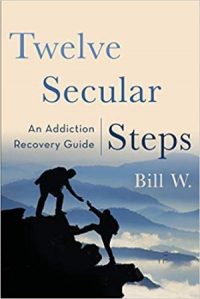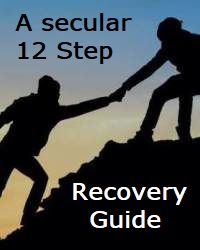Twelve Secular Steps: An Addiction Recovery Guide

By Chris G.
This short book (117 pages) by Bill W., no relation to THE Bill W., is a very timely addition to secular addiction literature for several reasons.
First of all, it recognises all addictions as biochemical brain problems, and therefore makes no distinction between alcohol and other addictive drugs. Having been brainwashed in early recovery about alcoholics being somehow different and (strongly implied) “better” than other addicts, I find this very refreshing. How many today, “in the rooms” and below geriatric age, are really, truly, pure alcoholics? Probably not a majority.
Second, the author exercises his biological expertise – “a PhD in a biologically related field” – to explain, in accessible language, our current understanding of the brain, its reward-centred behaviour, and how some substances work to create the disease we call addiction. Here he does differentiate between various drugs, since they have slightly different effects at that level, and that is appropriate and useful information.
And third, he gives a nice, clear set of non-Christian 12 Steps with ample explanation and historical relations to the originals, and uses them in a walk-through of a well-planned recovery program.
Chapter 1, The Separation of Religion and Recovery, does exactly what the title says: it makes clear that recovery is not bound to any religion; it is a thing on its own. He agrees that if an individual has a religious proclivity, it may help that one individual, but it is not at all necessary. There is a very nice historical précis of the origin of AA and the original 12 Steps, which would be valuable to a newcomer surrounded by a group of old-time Big Book thumpers who have Got It All Wrong Anyway.
In Chapter 2, The Biology of Addiction, we have an excellent summary of current knowledge of brain function and how it responds to the chemicals it may crave so much. This is necessarily a bit technical, but the language is clear and simple, and it is knowledge any addict really, really should try and understand. Knowing what is going on in your brain should be a part of every recovery. If you have a sore leg, and don’t know whether it’s a bruise or cancer, how do you decide how to treat it?
Chapter 3 is a discussion of the Characteristics of Addiction, and Addicts. This goes through the stages of addiction in a tried and true fashion: normal psychological development, risks of addiction, symptoms, and “bottoming out”. This is good reading for anyone who is still wondering if she is an addict.
Chapter 4, Overview of Secular Recovery, gets into the nuts and bolts of getting better. It is a very nice preview of what to expect as one starts on the recovery path. Largely centred on Maslow’s hierarchy of human needs, it is pretty standard stuff. What makes this chapter different from many similar tracts is the focus on recovery as a secular activity; not in any way putting down any religious expectations or experiences, but simply not requiring them. This should make it quite accessible for secular readers.
The last three chapters are devoted to a step-by-step plan of recovery, using the secular steps introduced at the beginning of the book. He divides the steps into three phases:
- Chapter 5, Steps 1-2-3 are Early Abstinence;
- Chapter 6, Steps 4-9 are Personal Reconstruction, and;
- Chapter 7, Steps 10-12 are Long Term Sobriety.
These chapters provide a very detailed treatment, with some mild bias obviously from personal experience, and its real value is not so much in the detail, as in it being an example of a plan. One of the author’s strong arguments is that without a plan, an addict will have a much rougher time of it; he’ll be less focused and subject to many changes in direction. Getting a sponsor who knows what she’s doing, and getting close to like-minded and successful group members, are important in developing a plan and sticking with it. From my own experience, I heartily agree.
In summary, I find this book brief, concise, easy to read and understand, and likely to be valuable to anyone thinking about recovery, or in the early stages. If you think of AA or NA as some sort of cult or religious organization, definitely read this book. I seriously think that had I had access to this on my first abortive try at AA, it might have saved me many years of harm, since the God Squad did chase me away back then, and even on my second and successful experience, the fake-it-till-you-make-it factor was pretty bad, and very unnecessary.
Definitely read this book if you want recovery but are a secular person!

The book – which is very modestly priced – can be purchased at Amazon.com as a paperback or Kindle. (It is also available at Amazon in Canada and the United Kingdom.)
And you can get it at Barnes and Noble.


























Good article. After almost four years in existence here in the “buckle of the bible belt” we are slowly acquiring a following of people who are getting sober, staying sober and enjoying their lives without religion in our lives. Keep up the good work.
Great review, Chris — thanks and thank you Roger for publishing it…
Ordered the book today.
Hi my name is Mister V
I was told that AA is the crescent wrench that will fit any nut in the room. AA is not religious in any way. The religious approach is just one perspective of recovery among several that really work if you work it. I have known several people who did not have or use a HP. Bill’s personal belief systems influenced him as the writer of the AA book. If AA was religious it would of course fail. My opinion is that less is more and more is unnecessary.
In the broader sense of the word “religion,” AA is very religious.
Before there was an AA book, the recommended reading included almost exclusively, religious texts, not the least of which was “The Varieties of Religious Experience.” The key message of that book is that rehabilitation is possible through religious conversion, according to Professor Ernest Kurtz.
To compound things, every freaken group that closes with The Lord’s Prayer makes AA more religious than it needs to be.
Amen.
Mr V has said it all! Yes, contempt prior to investigation can, indeed, very likely close the door to understanding and opportunities you might be very well be sorry to miss, including a viable and sustainable Recovery Program!! I did very much like that an entire section of the book is devoted to the neurobiology of this disease. I very much liked the analogy that one needs to know the cause of one’s sore leg in order to know how to treat it. So I would therefore like to make a strong recommendation. The very short book Questions & Answers about Addiction by Howard Wetsman, MD, while also somewhat technical, gives not only a very excellent explanation of the congenital difference in the brains of addicts and what happens when their brains are exposed to addictive substances, BUT it also explains very clearly WHY strong fellowship groups (the overwhelmingly most ubiquitous of which is AA) that emphasize supporting one another and service to others are the KEY to successful ongoing Recovery.
Yes, whatever can get people into a strong, on going and sustainable recovery program with a sponsor who, along with the rest of a caring, non-judgmental fellowship can guide, mentor and help to keep the addict/alcoholic accountable — well I say more power to you!! We are losing well over 200 people PER DAY to this out of control disease!
I love the new look of AA Agnostica! Thanks for the book review, Chris. I also will give this book a positive recommendation. I think it’s particularly good for the newcomer and it’s something I wish I had available some thirty years ago.
I like books.
Because I write about recovery, for profit (miniscule as the $$$ may be), book purchases like this are tax deductible, so away we go!!
I agree wholeheartedly with the need for a plan. The details of the plan, I believe, are relatively unimportant. Sorry fundies, your “cake recipe” talk is just lip-flapping to me.
On the other hand, those following the “just don’t drink” plan are setting themselves up for a low probability of success. If going to meetings is my main defense against alcoholism, I’d be wise to go to a boatload of them, and try to not get apoplectic at every mention of the God word.
I see great psychology underlying most of the 12 Step practices. The language is screwed up for me, so I do some translating.
Our Whitby Freethinker Group is nearing its five year anniversary, and we’ve been able to really help some people. But, time to keep it real—sometimes our once weekly meeting sucks! Yep, a secular meeting can suck when the blatherers take to blathering. New people, stepless, and sponsorless, forswearing all traditional meetings, but diligently coming to Freethinkers once a week (if nothing better is going on) do not tend to do well.
Translated steps offer a workable plan for many.
27th year continuous sobriety following the Genuine 12 Steps
of Alcoholics Anonymous and working with sponsors and other sober recovering women. Attendance at AA meetings plus investing time, heart, mind and effort in the Fellowship of AA have helped me immeasurably. I found God in AA without any pressure… only guidance and room to to doubt and question.
The main good thing about the 12 steps is it gives a person needing recovery something to DO. Without, we can be a bit lost, no direction, how do we make changes? But just about anything else that we could give a newcomer to do would be good, well, not just anything, but what I’m trying to say is that the 12 steps are in no way better than many other things.
And they ARE poorer than they need to be. Even taking the god stuff out, we still have issues with the “moral” inventory. If alcoholism is not a moral failure, is it still a good thing to berate ourselves about our shortcomings, character defects, etc… Please read more about my thoughts on this at AA Beyond Belief: Fix Broken Self-esteem with Ego Deflation? Huh?
It is difficult to dislodge a tradition, but maybe we need to come up with “The Seven Principles of AA” or something like that to use in addition to (instead of) the 12 steps, so we don’t have to concern ourselves too much with all the problems with the steps.
My experience in traditional AA meetings is that a few pretend to be practicing and living the AA way of life, but even fewer can and do describe the actions they take to think things through and assume responsibility for their own recovery outcomes. Furthermore, most seem to use “spirituality” as another code word for religion.” Flat toxic flat earth cosmology has no place in our ever-expanding awareness of the universe physiology, psychology and brain science. Pretending to know things we don’t know is dangerous. Remember, Bill wrote that “We alcoholics are undisciplined.” We refused to learn from our own experience. However, we have a process for self-examination, confession of shortcoming and defenses, and the leveling of our pride that leads to successful fulfillment of an ongoing recovery process. It is not a one-time housecleaning process. As a way of life, it must continue for a lifetime. We then have a detailed story to share with others as our example.
Whatever works for you, the more the merrier and the more information is great. Good luck peeps.
Helping one recovering person is the language of love. Regardless of books, theology, race, color… on and on… we all have the very essence of love. Share freely without judgement. Peace.
I ordered the book. The Big Book and Bill W’s 12 & 12 have a very religious tone. This has been a huge distraction for me because I have to re-interpret everything just to get the religion out. Everyone is an armchair psychologist, no science behind the absolutes I hear dozens of times every day. I keep coming back but I would like a sobriety guide that doesn’t require pretzel logic.
There is a Canadian Steely Dan tribute band called “Pretzel Logic.” 😉
Don’t know if ya’ll know this but there’s another Fellowship which is all inclusive and focuses solely on addiction and not a particular substance. It’s a spiritual, not religious, program known as Narcotics Anonymous. Just throwing you a bone so you don’t waste your time rediscovering what’s already been written.
well NA is just a little bit more not religious than AA, because it is a little bit newer, and so, got to learn a little bit from AAs mistakes. So the literature is a little bit better. Not pushing god to the same shameless degree as early AA. But all the basic tenets are still the same. Higher power, ego deflation, character defects. Anyway, I have gone to NA quite a bit as an alcohol addict, though I never really had issues with any other drugs, and I liked many of the readings better. But all the 12 step programs suffer from the same flaws, and all ought to go through major changes.
This type of shit just hurts me so much. It’s a spiritual program not a religious one. Why are you changing and adding new shit to a program that already works? Do you have any idea of the success rates of the treatment centers and therapy ? Less than 10% that’s atrocious. Spirituality is what heals addicts not psychology bullshit. This makes me so sick. Watering down what’s already become a watered down program. Thanks you’re doing great.
Evan, thanks for joining us. A primer on your question could be:
Don’t Fix It If It Ain’t Broke
First sentence says it all!!! Ignorance is irritating.
Trust God, clean house and help others. Keep it simple. Been working for me for 36 years, my daughter for 10, my wife for 29, my brother for 32. I could go on. AA is a beautiful recovery program. Unfortunately it’s not for everyone.
Tom, thanks for joining us. Unfortunately many oldtimers (though I’m one myself) have this idea that AA is perfect as it was conceived by a just 3 years sober guy 80 years ago, and – as the only organization in all of human history – will never need substantial improvement or change with the times. And that there is no good reason to consider how it may be changed to work for more people than it does. The people it doesn’t work for, it’s just too bad, it’s their own fault for not wanting it badly enough. I’ve always been of the opinion that our primary purpose was to help the next suffering alcoholic. It never said anything about it being my way or the highway. That seems like too much alcoholic thinking to me.
In the name of open-mindedness, please have a look at my current article on AA Beyond Belief, Fix Broken Self-Esteem With Ego Deflation? Huh?, which describes a large group of AA members whom our, yes, OUR, program does not work very well for, and some possible changes we could make.
Finally, a clear and pragmatic take on the process, the program of action chronicled in the Big Book and recovery experience that led to the beginnings of AA!
I was personally grateful that Bill admitted he knew but a little 79 yeas ago and more would be revealed. When I entered AA, it became obvious that the literalists seemed to ignore the full story, the “precise directions” Bill attempted to outline, particularly on pages 60 through 83 and on to 108. Most members seemed to be reciting the introduction to “How It Works”, making up their own process and understanding. Don’t get me wrong, at 40 years of continuous recovery, I treasure the provocative wisdom in that book and other stories. The “spiritual program of action” has enabled me to overcome multiple addictions, to slowly let go of old, magical ideas, expectations and thinking, by tapping into the promised unsuspected power within.
My 1939 dictionary continuez to be a great help in attempting to understand Bill’s writing, a most helpful key is its first definition of “spiritual,” nonmaterial. The continuing practice of Steps 4 through 9 in language that works for me teaches me to pay attention to my attitudes, emotions, ideas, opinions and understandings (AEIOU), as well as resulting behaviors. This action uncovers causes and conditions behind my disease, the discomfort I may feel tempted to self-medicate. Becoming open to this new way of thinking and living in a supportive and accepting fellowship has been essential to my progress.
Finally, I am convinced that daily application of the entire process as I understand it is essential to continuing growth in understanding and effectiveness. However, I doubt that I could ever have accomplished this without the latitude to interpret and apply the step process according to my own background and experience, as stated on page 191 of As Bill Sees It.
This book provides a much needed and deeper understanding of the dependence and addiction process, as well as pragmatic understanding of work of progressive recovery.